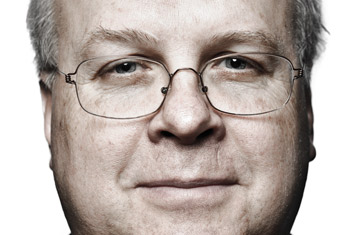
Karl Rove photographed Febuary 10th, 2010, as part of the World Affairs Council of Oregon's International Speaker Series, Portland, Oregon.
(5 of 7)
By Election Day, Law says, Crossroads hopes to have spent about $200 million just on the race for the White House--about as much as McCain raised in the entire 2008 campaign. That doesn't include the additional $100 million Crossroads intends to spend on the fight for Congress, especially the Republican effort to wrest control of the Senate from the Democrats. Crossroads ads have battered Democratic candidates like Nebraska's Bob Kerrey ("Bailout Bob"), Ohio's Sherrod Brown ("voted with Barack Obama 95% of the time") and Missouri's Claire McCaskill ("ObamaClaire"), putting Republicans in position to control not only the White House but also both chambers of Congress for the first time since 2005.
Crossroads also serves as a kind of mother ship for a fleet of well-financed Republican groups, each with a distinct mission but all working in concert. It's illegal for a federal candidate or party committee to coordinate with an outside group, but the groups can work with one another. Thus, the Crossroads offices host regular meetings of people from up to 20 conservative groups who gather in the glass-enclosed conference room to discuss the Electoral map, share polling and voter data and divide up their respective efforts. The groups have included Grover Norquist's Americans for Tax Reform, the U.S. Chamber of Commerce (which will spend some $50 million) and Americans for Prosperity, a nonprofit group founded by the libertarian mogul brothers David and Charles Koch. All told, these organizations could spend $1 billion supporting GOP candidates in 2012.
Collectively, the operatives are known informally as the Weaver Terrace Group, after the Washington, D.C., street where they first gathered, in the home of Karl Rove. "This is not some faction of the party or issue cluster," Norquist says. "It is the equivalent of the Republican National Committee, with more agility and less overhead."
Crossroads can't work with the Romney team, but the familial ties between them are extensive. Crossroads' political director is Carl Forti, who had the same title in Romney's 2008 campaign and who helped create Restore Our Future, a pro-Romney super PAC that spent $50 million in the primaries and may spend an additional $100 million by November. Gillespie, who helped Rove create Crossroads, now has an office at Romney's campaign headquarters in Boston. And when Romney held a June retreat for his top fundraisers in Park City, Utah, Rove attended the event--an action even one Republican involved in super-PAC work calls uncomfortably close to the legal line. "It was shocking to me that he went," he says.
Not everyone sees Crossroads as a fearsome political Death Star. Democrats point out that the group has spent tens of millions of dollars bashing Obama, with little clear effect on his poll numbers. Even some Romney supporters grumble about the quality and impact of Crossroads' advertisements. Law counters that opinions about any incumbent are hard to shift dramatically, but he says a Crossroads advertising assault during last year's debt-limit battle undermined Obama's image as a strong leader. And while Law concedes that Crossroads has not yet fundamentally reshaped any major Senate race, he says Crossroads has forced Democrats into new spending just to hold their ground.
